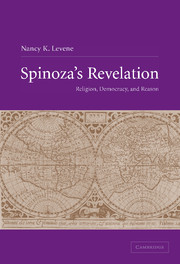Book contents
- Frontmatter
- Contents
- Preface
- Acknowledgments
- List of abbreviations
- Introduction
- 1 Vera religio
- 2 Spinoza's Bible: Concerning how it is that “Scripture, insofar as it contains the word of God, has come down to us uncorrupted”
- 3 Politics, law, and the multitude
- 4 Reason, revelation, and the case of the Hebrews
- Conclusion
- Bibliography
- Index
3 - Politics, law, and the multitude
Published online by Cambridge University Press: 22 September 2009
- Frontmatter
- Contents
- Preface
- Acknowledgments
- List of abbreviations
- Introduction
- 1 Vera religio
- 2 Spinoza's Bible: Concerning how it is that “Scripture, insofar as it contains the word of God, has come down to us uncorrupted”
- 3 Politics, law, and the multitude
- 4 Reason, revelation, and the case of the Hebrews
- Conclusion
- Bibliography
- Index
Summary
A man who is guided by reason is more free in a state, where he lives according to a common decision, than in solitude, where he obeys only himself.
(E IV p73)The politics of the multitude
Spinoza's focus on the equality and sovereignty of philosophy and theology turns seamlessly into an account of equality and sovereignty in political life. What we have seen in the last two chapters is that both philosophy and theology are organically connected to certain kinds of political stances – that transcendence and immanence alike, taken in themselves, result in a confusion that fails to harness the human power that is actually available to us and turns human relationships into sites of conflict and strife. This confusion can be clearly seen, for Spinoza, in the ways the Bible has been read, and most especially in the assumption that it is either wholly true or wholly false. Texts, like all forms of human production, are works that express truth and falsity in close proximity to each other, and the task of reading is therefore always about establishing the principles that any given text itself enunciates. In this chapter and the next one, I turn to Spinoza's political theory, or rather his theologico-politics – his treatment of the relationship between God, law, and the twin ideals of freedom and obedience.
- Type
- Chapter
- Information
- Spinoza's RevelationReligion, Democracy, and Reason, pp. 136 - 188Publisher: Cambridge University PressPrint publication year: 2004



